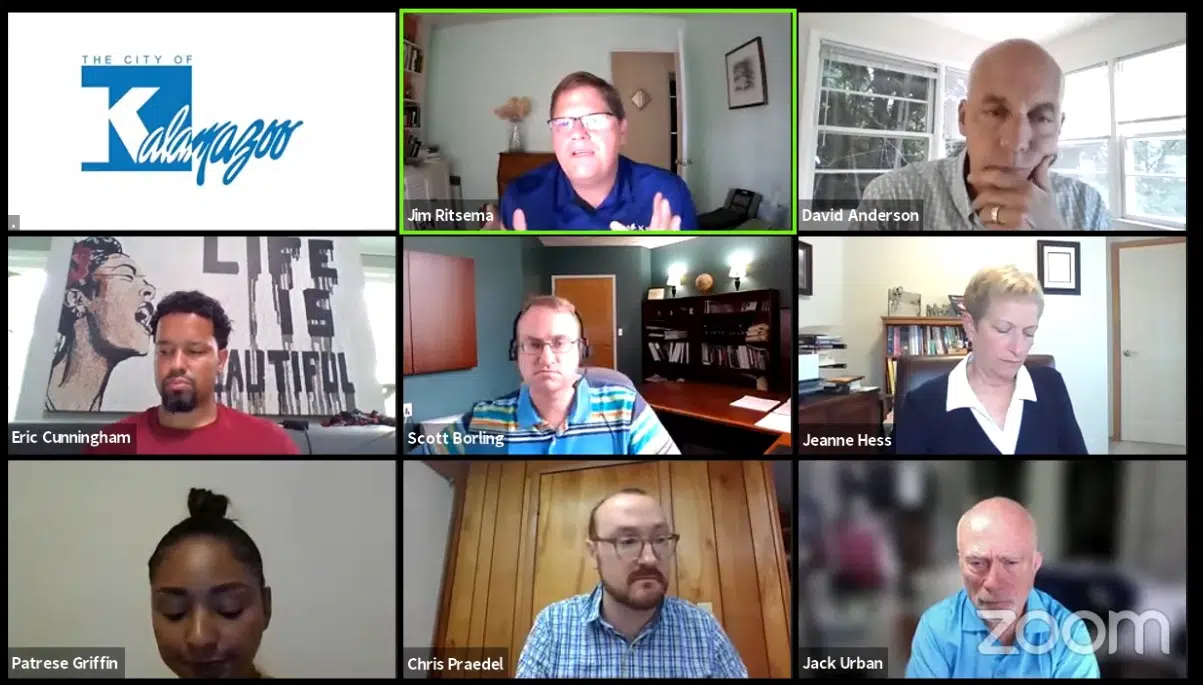KALAMAZOO, MI (WKZO AM/FM) – The Kalamazoo City Commissioners are still trying to work out the best way to return to in-person meetings, as discussed during a virtual Committee of the Whole meeting Monday.
During the virtual meeting, Commissioners discussed the matter at length, weighing the pros and cons of doing so, while also addressing safety and legal concerns. A decision one way or the other was not reached during this meeting.
The board had previously discussed the matter earlier this month, but decided to hold off on a final decision, as the board was unsatisfied with the first proposal.
City Manager Jim Ritsema said that returning to in-person meetings would require input from each Commissioner, which will be used to decide next steps, as well as protocols for in-person meetings.
The current recommendations were listed as follows –
- In-person in the City Commission chambers
- No social distancing requirements
- Mask only required for non-vaccinated persons per CDC guidelines
- Instructions, face masks and hand sanitizer provided at entrance
- Meetings continued to be live-streamed through Public Media Network, Facebook and YouTube
- Call-in public comments provided live during each public comment period, no longer playing pre-recorded comments
Of particular legal concern is the ability to hold virtual meetings with a proper emergency order, which is currently set to expire on August 31. The countywide emergency order expires on December 31.
The question, Ritsema said, is whether or not the City emergency order should be extended to December 31, if possible, which would allow virtual meetings to continue.
If yes, a resolution to do so would be required, Ritsema said. If not, the City Commission would need a plan in place by August 16.
City Attorney Clyde Robinson spoke on some of the legal implications.
“The issue is, we have, at least under the present state of the law, the ability to declare a state of emergency,” Robinson said. “My concern is that there should be facts that would support that declaration, and to some degree, there may be. The strength of the Delta variant of the COVID-19 virus may provide sufficient rationale to extend the emergency order. That’s my real concern, is that since the state has not issued any emergency order, in fact has basically repealed them, there really is not much in terms of factual basis to continue a state of emergency.”
He pointed out that there are no mask mandates or restricted gathering sizes, while also noting that the majority of those infected right now are unvaccinated.
He also was unsure on how enforcement of wearing masks by those who are not vaccinated would occur.
Commissioners had multiple suggestions for what protocols should be in place for in-person meetings. Noting the Delta variant, Commissioner Jeanne Hess suggested a return to requiring masks for all those in attendance.
“There’s still a possibility with the Delta variant to go back to full masking indoors regardless, that’s a possibility if we do go back to in-person,” Hess said. “Right now, Kalamazoo is at a 61.6 percent vaccinated rate. As a vaccinated person, I can also carry [the Delta variant] and be a part of the transmission stream. I’d be concerned about that in a close indoor environment.”
She is also concerned about the spread of variants in college towns such as Kalamazoo.
“I would love to be back in person, I want us to be safe, I want our community to keep each other safe and not fill up our hospitals like they have been,” Hess said. “We are not yet at 70 percent in our community.”
Regardless, Ritsema said it would be a matter of whether or not to extend the emergency order before other decisions can be made.
City Attorney Robinson echoed that the current spread of the Delta variant, as well as being in a college town, are causes for concern.
“The concern that has just been outlined by Commissioner Hess, we are a college town, we only have like 65, 66 percent of the county population vaccinated,” Robinson said. “As the news media has reported, this Delta variant is, at least in terms of getting sick, limited to the unvaccinated portion of our community. That’s really where the pandemic exists now. But as Commissioner Hess indicated, even though you have the vaccine, you might still be able to carry the Delta variant and unintentionally infect someone else, even if you don’t get sick yourself. Those are good rationales for coming to the conclusion, until there’s increased vaccination rates in the country, and until we know better about how this variant is going to behave, maybe safety is the path to take in terms of preventing the public, members of staff and commissioners from getting ill, and by extending the state of emergency until the end of the year.”
The virtual meetings would not be able to be held once the emergency orders expire in December, Robinson added. The creation of the resolution could be written in one meeting, or language could be crafted to extend the current resolution.
When it comes to hybrid meetings provisions would need to be worked out on how the public could participate, as well as how Commissioners would be allowed to participate remotely, if they chose to do so.
In summary of the discussion, Mayor David Anderson said it would appear that the current general consensus would indicate an openness to extending the emergency order to continue virtual meetings. He noted that the city could go back to in-person meetings sooner than December 31, or back to a virtual format should there be a drastic spike in cases.
In the interest of full disclosure, Commissioners Chris Praedel and Jack Urban also suggested a publicly released timeline of estimation for when in-person meetings will start again.
A final decision on the matter is expected in the next few weeks.









Comments